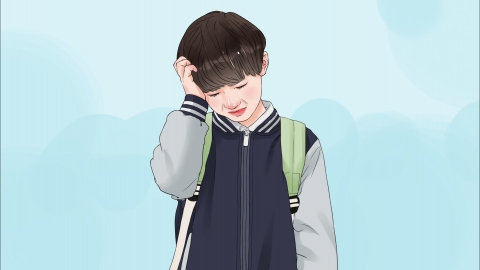What are the causes of headaches in third-year junior high school students?
Generally, the causes of headaches in third-year junior high school students may include excessive academic pressure, overuse of eyes, poor posture, anemia, and migraines. It is recommended to seek timely medical consultation to identify the underlying cause and receive appropriate treatment under the guidance of a professional doctor. A detailed analysis is as follows:

1. Excessive Academic Pressure
Third-year junior high school students often face the pressure of the senior high school entrance examination and heavy academic tasks, remaining in a highly stressed state for prolonged periods, which may lead to headaches, possibly accompanied by symptoms such as anxiety, irritability, and insomnia. It is recommended to schedule study time reasonably, ensure sufficient rest and relaxation, and engage in appropriate outdoor activities or exercise to relieve stress.
2. Eye Strain
Extended periods of reading, writing, or using electronic devices may cause excessive eye use, leading to eye muscle fatigue, which can affect the optic nerves and brain, causing headaches, possibly accompanied by dry eyes and blurred vision. It is recommended to maintain proper eye usage posture, rest the eyes periodically, and perform eye exercises to relieve eye fatigue.
3. Poor Posture
Spending long periods with the head bent while reading or using electronic devices increases the burden on the neck muscles, causing muscle tension and pain, which may radiate upward to the head, causing headaches, possibly accompanied by neck and shoulder stiffness and pain. It is recommended to change sitting posture regularly, perform neck-stretching exercises, and reduce the time spent with the head lowered.
4. Anemia
Due to academic stress, third-year junior high school students may experience irregular eating habits and insufficient nutrient intake, potentially leading to anemia. This may result in inadequate blood supply to the brain, causing headaches, as well as symptoms such as fatigue, pale complexion, and dizziness. It is recommended to take medications such as compound ferrous sulfate granules, ferrous gluconate tablets, and iron sucrose injections under a doctor's guidance.
5. Migraine
Academic stress and insufficient sleep in third-year junior high school students can easily trigger migraines. During a migraine attack, changes in neurotransmitters in the brain cause blood vessel dilation, stimulating nerve endings and causing headaches, possibly accompanied by symptoms such as nausea, vomiting, light sensitivity, and sound sensitivity. It is recommended to follow medical advice to use medications such as ibuprofen tablets, indomethacin tablets, and nimodipine tablets to alleviate symptoms.
It is recommended that third-year junior high school students maintain a balanced diet and consume more protein- and vitamin-rich foods, such as eggs and oranges, which help maintain good health.




